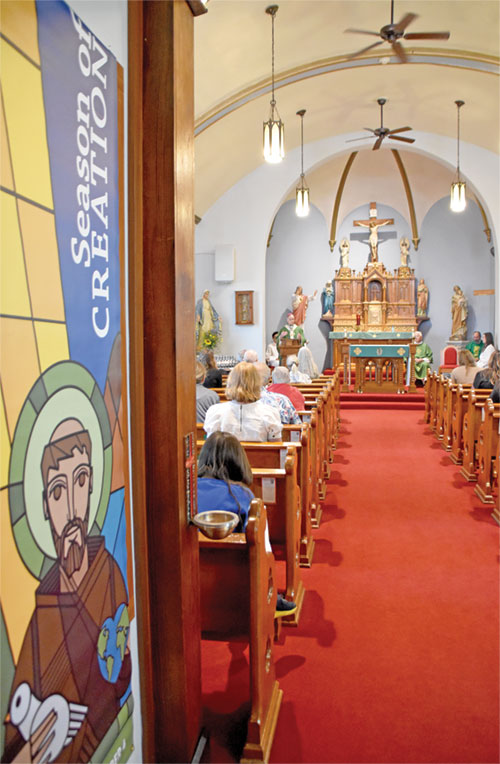Care for ‘our common home’ requires ‘radical discipleship,’ archbishop says

Archbishop Charles C. Thompson delivers a homily in St. Thomas the Apostle Church in Fortville during the archdiocese’s Season of Creation Mass on Sept. 4. (Photo by Natalie Hoefer)
By Natalie Hoefer
FORTVILLE—The weather was glorious on Sept. 4, a fitting state for the archdiocese’s annual Mass for the Season of Creation, celebrated this year at St. Thomas the Apostle Church in Fortville.
The annual liturgy marks the global Season of Creation from Sept. 1—the World Day of Prayer for the Care of Creation—through Oct. 4, the feast of St. Francis of Assisi.
The five-week focus was first promoted by the World Council of Churches in 2008. Pope Francis joined the Catholic Church to the movement in 2015, the same year he published his landmark environmental encyclical “Laudato Si’: On Care for Our Common Home.”
Archbishop Charles C. Thompson celebrated the Sept. 4 Mass, which was followed by a reception in
St. Thomas the Apostle’s parish hall.
Overcome disregard for ‘gifts of creation’
In his homily, the archbishop noted how the readings that day “describe the radical nature of discipleship, which necessarily demands that we be willing to emerge from our comfort zones and all that may seem familiar. …
“At the heart of such authentic discipleship is one’s relationship with the person of Jesus Christ. Without that personal encounter, such demands of discipleship will seem overwhelming if not impossible.”
The Gospel reading on Christ’s call to Peter to be a “fisher of men” (Lk 5:1-11) provides a perfect example of such a personal encounter, he said.
Archbishop Thompson shared a comparison he heard between that reading and the story in Mt. 19:16-30 of the rich man who asked Christ, “What must I do to inherit the kingdom?”
In the story from the Gospel of Luke, Peter was able to leave everything and follow when Jesus called because he “focused on [Jesus] … and there was a personal encounter,” said Archbishop Thompson.
Conversely, when the rich man asked Christ what he must do to inherit the kingdom in the story in Matthew, he was “really looking for a pat on the back,” he said. “Because when Jesus says, ‘Keep the commandments,’ … he says, ‘Well, I’ve done all that.’ ”
But when Jesus tells the rich man to sell all he owns and “come follow me,” the man walks away sad because he “never focused on Jesus. His focus stayed on himself,” the archbishop noted.
“We can call ourselves Catholic, we can call ourselves Christian, we can call ourselves spiritual,” he continued. “But if the focus stays on us and not on Jesus, we’re going to end up sad. … Each person seeking a personal encounter with the Lord must be willing to embrace the radical nature of that kind of discipleship that Peter shows. ...
“Only a response to this radical nature of discipleship will enable us to overcome humanity’s indifference and disregard for the gifts of creation, our common home.”
Archbishop Thompson noted that the theme for this year’s World Day of Prayer for Creation on Sept. 1 was “Seeds of Peace and Hope.”
When announcing the theme, he said, “Pope Leo expressed concern for this integral connectedness between the environment and people, especially the poor, noting that in a world where the most vulnerable of our brothers and sisters are the first to suffer the devastating effects of climate change, deforestation and pollution, care for creation becomes an expression of our faith and humanity.”
Thus, it was fitting to launch the Season of Creation with a Mass, Archbishop Thompson said.
“Here we are nourished in word and sacrament that we may go beyond our comfort zones to follow [Christ] in service of the Gospel to those in need, namely the poor, the vulnerable, the unborn, the migrant, the refugee, the sick, the elderly, prisoner, the dying, and of creation itself,” he said. “It’s all connected.”
He closed with a call that “we [may] be credible instruments of God’s transforming grace in creation and in ourselves.”
‘God created everything I have’
During the Mass, the offertory gifts were brought forward by archdiocesan Creation Care Ministry member Julie Reyes and her daughters Ana, 10, and Carmen, 8, members of St. Matthew the Apostle Parish in Indianapolis.
Ana has worshipped at the Season of Creation Mass in past years as well. She likes the Mass because it celebrates “that God created everything I have, and I’m grateful for that.”
John Mundell, who helped create the archdiocesan Creation Care Ministry 10 years ago, was also present at the Mass and the reception that followed.
Educating and engaging people about care for the environment “is a slow process,” he said. “But compared to 10 years ago, there’s a lot more awareness. It’s an ongoing effort, but it’s worth it.”
Father Aaron Jenkins, pastor of St. Thomas the Apostle and also of St. Michael Parish in Greenfield, has supported environmental projects in the two faith communities.
“As the two parishes in Hancock County, we’ve put over 10 acres of land into native grasses,” he said. “And at St. Michael, we planted close to 500 trees.”
One benefit he found from having acres of native grasses and wildflowers is saving on the cost of mowing.
“And the wildlife that we see now, because we have those native grasses on our campus, is just astounding,” he added, particularly at St. Michael where the plantings have been in place longer.
“We have more songbirds, way more butterflies and bugs, and just stuff that’s good for the environment,” said Father Jenkins.
“And then it’s also beautified the campus, so we have lots more people coming and just walking around,” particularly on the roughly 1-mile-long trail on the St. Michael campus.
“Care for creation is very big and central to my life,” said Father Jenkins. “It’s a good thing.”
(For more information on the archdiocese’s Creation Care Ministry and care for the environment, go to ourcommonhome.org.) †
